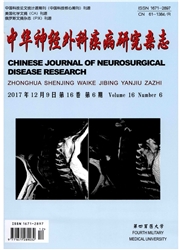

 中文摘要:
中文摘要:
目的既往研究表明,Homer-1b/c在神经元损伤后恒定表达,但下调Homer—1b/c能否对损伤的神经元具有保护作用尚不清楚,这也是本实验中待研究的问题。方法采用RNA干涉(RNAi)技术,抑制神经元Homer-1b/c基因及蛋白表达。通过Westernblot法分析神经元转染小干扰RNA(siRNA)后Homer—1b/c基因抑制效果。建立神经元机械性损伤模型,通过细胞存活率、乳酸脱氢酶(LDH)活性测定,研究下调Homer-1b/c基因对神经元损伤的保护作用。结果siRNA转染神经元后36h,Homer-1b/cmRNA和蛋白质表达明显被抑制。siRNA转染组神经元损伤后细胞存活率明显比阴性对照组、空载体组高(P〈0.05)。阴性对照组、空载体组和siRNA转染组神经元损伤前培养液LDH性无统计学差异(P〉0.05),机械性损伤后24h,与阴性对照组及空载体组比较,siRNA转染组LDH活性明显降低(P〈0.05)。结论Homer—1b/csiRNA转染神经元效率较高,基因抑制效果显著。降低Homer-1b/c蛋白表达能够减少机械性损伤后继发性神经元损害,对神经元具有一定的保护作用。
 英文摘要:
英文摘要:
Objective Previous studies demonstrated that there was continuous expressing of Homer-lb/c after traumatic neuronal injury. The present study is to investigate whether down-regulation of Homer-lb/c gene could affect neuronal viability. Methods RNA interference (RNAi) was used to down-regulate the expression of Homer- lb/c mRNA and protein in neurons. Western blot was used to determine the Homer-lb/c expression after specific small interference RNA (siRNA) transfection. The neuroprotective effect of Homer-1 gene inhibition on injured neurons was obseived in mechanical neuronal injury model by detecting the lactate dehydrogenase (LDH) activity in the medium and neuronal viability using trypan blue staining. Results Expression of Homer-lb/c mRNA and protein was significantly inhibited 36 h after siRNA transfection. The neuronal viability in siRNA transfection group was significantly h/gher than that in negative control group and vector group. Before mechanical injury, there was no statistical difference of LDH activity in negative control group, vector group and siRNA transfection group (P〉0.05). Twenty-four hours after mechanical injury, LDH activity in siRNA transfection group decreased significantly and there was statistical difference compared with negative control group and vector group (P 〈0.05). Conclusion Homer-lb/c protein is involved in the mechanical injury of neurons and it is potentially effective in protecting the neurons from death after primary injury by successfully inhibiting Homer-lb/c expression with Homer-lb/e specific siRNA.
 同期刊论文项目
同期刊论文项目
 同项目期刊论文
同项目期刊论文
 期刊信息
期刊信息
